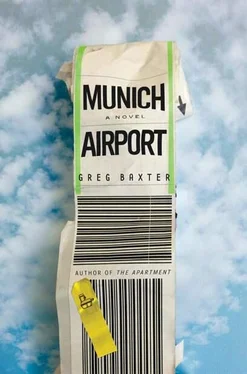I thought he was going to give me the dress. I nearly put my arms out to receive it. But he turned as if to place the dress in the pile of clothes behind him and I said, Hey, wait. He stopped. Do you think we could have that? I asked.
Have what?
Obviously the dress.
He said, If I hadn’t told you what it was, you wouldn’t care. But you did tell me, I said, why did you tell me? He held it out and up in front of me and said, What are you going to do with it? I was about to say we could bury it with her, then I remembered the wedding wasn’t real, and I had no answer, except to say something sentimental, and for many reasons saying something sentimental about wanting to save that dress was unthinkable. I said, Listen, I have to go, I need to lock up.
Right now?
Right this minute, sorry.
Otis was reluctant to go, he moved directly in between me and the things he’d set aside behind him, so I said, Take whatever you can grab now and I’ll let you know when I’m coming back so you can get the rest. He didn’t believe me so I said, Take the dress now if you want, take anything you can carry out of here. I moved away and gave him a little bit of space. He didn’t have a bag with him, so I went and got a bag of my own and handed it to him, and when I handed it to him I looked down at his stack of books, fifty at least, and all of which were nice hardbacks, and saw my father’s book. I said, That’s my dad’s book. He said nothing. Now that I knew that Miriam had made notes in her books, I bent down to reach for it. Otis bent down, too, as though to stop me. I stood up and said, You cannot have that book, Otis, I’m sorry. He said, I was just going to get it for you. He picked it up and opened it and a yellow page of tablet paper came out. He gave me the book but he held on to the piece of paper. Give me the piece of paper, I said. He was reading it. I said, Give me the piece of paper, Otis. I didn’t want him to read it, I didn’t want him to touch it. So I grabbed it and yanked it from him, and it ripped in half. He immediately gave me back the other half, and gave me a look that said the violence hadn’t been necessary. Sorry, I said. He stood and waited for me to look at the piece of paper, but I wouldn’t look at it, not while he was in the room. He grabbed some books and some clothes but for some reason he left the jewelry, and I suspected it was because he thought I might confront him over that, too. Anyway, he left. I walked over to the table and placed the two pieces of paper back together again. It was the first page of a letter written by my father to Miriam. I’d never received a letter from him, but that was because, I assumed, we spoke on the telephone, and I visited. I remembered I had seen some Scotch tape around, I went to get it, I came back and taped the letter up. I taped it so thoroughly that it looked laminated. I folded it up and put it in my back pocket. I got the book and went through it, to see if there were any other pages of the letter in it, but there weren’t. And there weren’t any notes in the margins, either. I closed the book and put it in a bag. It was a big hardback, a thousand pages long, and on the back flap it had a photo of my father that was outdated even at the time. The picture is of a man my age now. It’s fuzzy, he’s wearing a suit, his hair is brown, and he’s standing in front of the sea. It’s clearly not a professional photo, he just found a photo of himself he liked and used it. My mother had been alive when the photo was taken.
I didn’t take anything with me but the book and the letter. I had a feeling that he’d want to know immediately about this, about the fact that she’d kept the book all these years, and I was excited about being able to hand it to him. I felt as though my time here, from his point of view, would finally be justified. But then I did something that completely contradicted this excitement. I brought the book downstairs and put it in the basket on the front of my bicycle. It was still wet, still chilly. The roads and sidewalks were full of puddles. The roadsides were muddy. When I felt I had got far enough away from Miriam’s apartment — I guess I was about halfway between her part of town and ours — I got off my bike, found a spot of wintery, wet muck, and threw the book into it. Then I got back on the bike and rode to our hotel. I walked in and the lady at reception informed me that I’d checked out. I’ve checked out? I asked. That’s right, she said. Am I leaving town? I asked. She didn’t have an answer, so I telephoned Trish and she told me the woman was supposed to give me a message saying that my father had had my things moved — later I would learn that it had been done by an embassy intern — to a new place, an apartment he’d rented. So I went straight there. It was the penthouse apartment of a building of luxury, boutique rental apartments. The penthouse had a rooftop terrace that was a hundred yards long and fifty yards wide. You could see everything from it. Every inch of horizon. We had three bedrooms and four flat-screen televisions. Though I didn’t know it yet, we were going to rent a car in two days and get away, but we would keep the apartment, we would just leave it empty and return to it.
I don’t have the letter anymore. I don’t remember when or how I lost it. I folded it up and carried it around with me everywhere, for a few days. If I had a quiet moment, I pulled it out and read it. Then one morning it wasn’t there. I checked under the driver’s seat of our rental car. I checked the room I slept in. I checked all my pockets. I even checked the trash can on the street, where I had thrown away some fast food the previous night. But it was gone. I thought, for a moment, that my father might have found it, but if he had, I’d have known, he’d have asked me immediately about it.
My father’s letter had been written in black fountain-pen ink on yellow lined paper. He’d obviously wanted her to have the book, and he must have felt he ought to send it himself, and if he were going to do so, he’d have to write a letter to go with it. Or, just as plausibly, he’d been wanting to send Miriam a thoughtful letter since she left, and the book just gave him an opportunity to be in touch. I considered the remote possibility that he had finished his book for this reason only. His letter began with a few lines about hoping that she is well and that she’ll find enclosed the book he’d been working on for years, which turned out to be a little redundant now that a similar book on the same subject had come out. At the time he wrote the letter, I had just been there to visit him, because even though he’d made nothing of it, I thought it would be nice to visit him around the time of publication, point out the good reviews and shield him from the negative ones. He writes, Your brother was here to see the book off and protect me from depression, I guess, but now he’s gone and the house is very quiet again except for the television, which I have no interest in apart from checking the weather and watching a little bit of golf. And I walk around wondering why I’m not back at work. I live in one room of the house, and I sleep in another. I walk through the other rooms to make sure everything is as it was. I took the semester off and used the book as an excuse, but I find that I’m terribly sad to be here without you in some proximity, without seeing you from time to time. I’ve missed you profoundly these last years and am beginning to wonder if I’ll see you again, or if you’ve simply decided to leave us, in which case it’s like a whole new death for me to come to terms with, but it is much more difficult to bear, not only because I know you’re alive in some other place, but that I fear that resentment for me has sent you there. I can see that my great failings in life were with my mother, your mother, and you, and I don’t know how to account for the expectations of you all that I allowed myself to have. I seem to have sent them to death here and I understand why you might have wanted to escape that. I respect your silence and your distance but I also hope it doesn’t last forever. I wonder if you have everything you need in your apartment. I wonder if you could use a washing machine or a new refrigerator. I wonder if you have proper heating, and I’d be happy to get you some heaters. If it adds to your electricity bill, I’m happy to contribute there, too. I wonder if you’ve found someone there, a companion. I hope you’d contact your brother for help if you wouldn’t contact me.
Читать дальше











